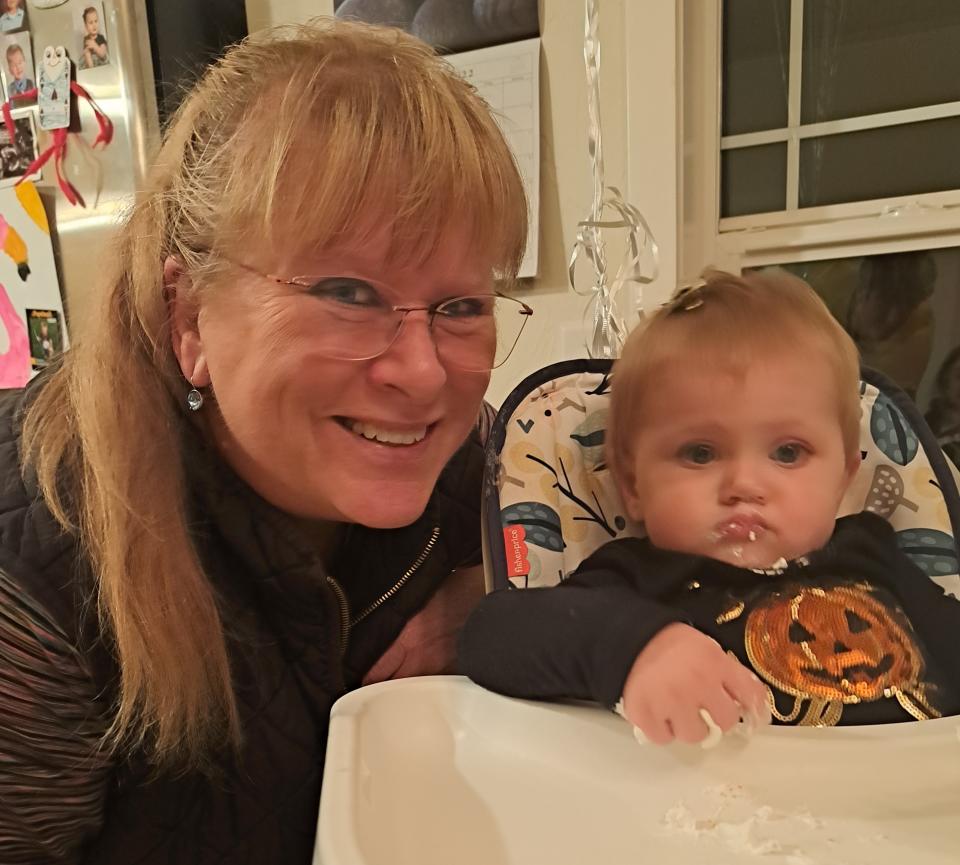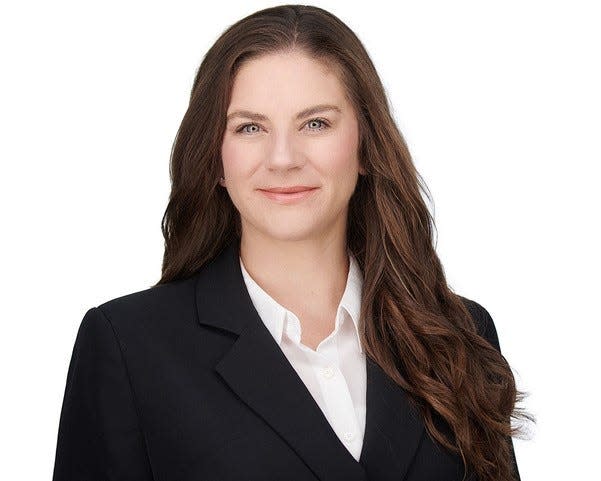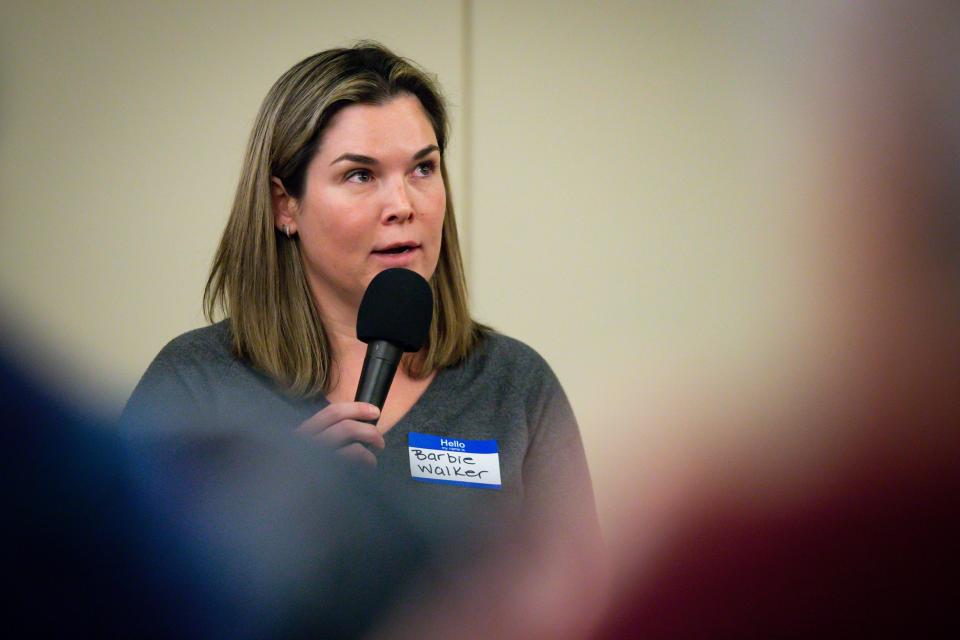Q&A: Candidates for Eugene's Ward 7 discuss priorities, homelessness, Willamette Greenway
The Register-Guard asked the three candidates running for Eugene's Ward 7 questions about challenges facing the ward, potential solutions and why they are voters' best choice.
Janet Ayres, Lyndsie Leech and Barbie Walker are vying for the city council seat, which is open because of a successful recall against former councilor Claire Syrett.
All three applied for the interim councilor position, and Leech has been serving in the role since December.
Answers from the three have been edited for length and clarity.
Question: What makes you the best candidate for the role?
Ayres: I have the experience to know our Ward 7 community very well, and I would be a true advocatefor Ward 7 voters and not for certain advocacy groups or financial interests.
I've lived and been engaged in my Ward 7 community for 34 years, during which I raised my three children, two of whom also now live in Ward 7 with five of my grandchildren.
I worked for two years in Head Start's children's nutrition program in the Whiteaker neighborhood. I served for two years on the Executive Board of the Whiteaker Community Council neighborhood organization and helped initiate the "Quiet Zone" campaign.

I've trained and become certified as a Community Emergency Response Team volunteer so that I can help save neighbors' lives if fire or natural disaster strikes.
I have voluntarily limited campaign contributions from outside organizations to no more than $100. I will put the interests of Ward 7 residents and businesses ahead of narrowly focused advocacy groups and financial interests.
Leech: I represent many different perspectives that will be important on the City Council. For example, I was a tenant for many years and now am a home-owner and small-time landlord. I have felt the effects of poverty and housing instability growing up and have worked very hard to get to where I am today. I am a mom of young children and know what our families have gone through and what they need to succeed. I have faced mental health challenges myself and got better and now help to treat mental health challenges in others. I am a peer support specialist which has taught me to be an excellent listener and empathetic, as well as able to help connect people to the services that they need to thrive. This makes me very passionate and compassionate in addressing our community’s struggles.

Professionally, I have a Master’s of Public Administration in Organizational Sustainability − this means that I am able to improve an organizations' systems and ensure that it can continue, revenue-wise, as well as looking to the future for what programming is needed and what will be supported. I have raised millions of dollars for several local nonprofits which has led to improving our community in many substantial ways, like building a new intensive behavioral health treatment center for children, creating a crisis and acute transition services program to help divert suicidal teenagers out of the emergency department and into appropriate care, and many others.
As the executive director of a nonprofit now, I work everyday to be a good steward of state and local funding to do work that is greatly needed in our community. I know what it takes to work together to get the job done.
Walker: I am the best candidate to deliver the competent common-sense change Ward 7 is seeking for our City Council. Residents want to feel safe in their homes and their community. I will make visible progress utilizing the existing budgets. I will have a strong voice for the people on transportation proposals that would confiscate people's personal property, land and restrict vital lanes utilized by working families & first responders.
I will give the people the right to vote, especially on vital energy options crucial for heating, cooling, living for our elderly, underrepresented and beyond. I am the voice for those in this community who don’t feel their opinions are represented at council.

People want leaders committed to moving the meter for the well-being of residents who live, contribute, and choose to retire here. My focus will be on the people of Ward 7, our neighborhoods, or families and returning the security and economic vitality our community deserves.
Q: What are your top 3 priorities?
Ayres: My top priorities are based on what I’ve heard from people who live or own local businesses in Ward 7:
Financial security of their households and businesses.
Safe and livable neighborhoods and parks.
Dealing with homelessness in a compassionate and accountable manner.
I will advocate for policies, regulations, and incentives that support local businesses and local workers, rather than outside development interests, which the current council majority has favored with huge tax breaks and upzoning our neighborhoods.
I will vote to fund adequate emergency and public safety facilities and staffing to ensure residents' safety, especially in Ward 7 where the council’s upzoning will create much higher density than current service levels are prepared to protect.
I will seek to rescind the extreme upzoning of single-family neighborhoods, which will displace lower income renters, degrade neighborhood livability, and provide substantial profits for large, private equity funds based outside of Eugene.
I will support safe and healthy shelter for unhoused individuals who abide by reasonable rules that ensure the safety and peace of other citizens of our community. I will advocate for stronger measures to crackdown on predatory criminal vagrants who victimize both our homeless and housed neighbors.
I will pressure the mayor to demand that Lane County and state officials meet their statutory obligations to fund addiction and mental health treatment and shelter for the homeless, instead of foisting off these responsibilities on Eugene taxpayers.
Leech: My three priorities are mental health, housing and homelessness and protecting our natural environment.
Mental health: We must do better to address Oregon’s mental health crisis right here in Eugene, where we have too few therapists and counselors to address the issue. With my 13 years of experience in the behavioral health field here locally, I have the depth of knowledge needed to help the city address this crisis.
Housing and homelessness: I will do everything in my power to help get our unhoused population sheltered. This includes supporting more affordable housing options, increasing our overall housing supply, and working closely with our area's nonprofits, the county, and developers, as well as looking at where people will be allowed to camp and measures to help prevent homelessness.
Protecting our natural environment: I promise to protect and preserve our green spaces so they can be enjoyed for many years to come, while balancing the other needs of our community.
Walker: My three priorities are:
Economic development & prosperity for Eugene citizens via transparent collaboration between Eugene communities and the city of Eugene.
Utilizing reliable working programs within existing budgets for public safety, health, addiction, homelessness and the unhoused and ensuring sustainably of the in place programs.
Energy infrastructure and its ties to transportation infrastructure while being mindful of preserving our beautiful green open public spaces
Q: What specifically would you do to increase legal places for the unhoused to sleep and affordable housing? How fast can you do this?
Ayres: I unequivocally believe the city must make available safe and healthy shelter for unhoused individuals. Current city officials seem stuck on limited, expensive approaches. I would push for innovative alternatives that have been successful in other cities, such as the “Safe Parking Program” in Santa Clara, California.
I would redirect current city strategy on housing affordability away from huge tax breaks to large investors in market-rate housing and focus on the true need, which is financial assistance for very low-income renters.
We need more funding to shelter our unhoused citizens and enable very low income households to afford their rents. The city is squandering funds by granting tax breaks and hugely profitable upzoning to benefit investors in upscale development and gentrification.
The city must stop subsidizing any housing development except for “deep affordability” of multi-family dwellings. In addition, the city must implement “land value capture” from developers of land that was upzoned by the middle housing code amendments. Boston has demonstrated a highly successful program that allocates some of the developers’ profits resulting from upzoning to fund affordable housing.
I would also push to restrict demolition of existing “naturally occurring affordable housing” and to limit short-term rentals of entire houses to one dwelling per local owner.
Leech: The state’s mandate to allow camping on public lands leaves room for interpretation at the local level. At the City Council, we are working on what limitations to this bill (HB3115) we will put in place in Eugene City Code. I believe that rather than focusing so much on where we are prohibiting camping, we should designate where we can allow it, and provide garbage and bathroom services in those areas.
We need sufficient places to allow people to be because otherwise we are just forcing them to move around the city, causing undue burden to them, to other residents, to our enforcement teams, and to social service providers that would be able to help them. Several apartment complexes for low-income housing have been approved by Council and are in the process of opening or being built. We will need more to address the shortage.
The code that we are looking at for camping regulation has to be updated by June and will take effect immediately. Unfortunately, we can’t fix everything overnight, but we must give more urgency to this issue.
Walker: Overwhelmingly, respondents have continually expressed concern and frustrations about homelessness in our community, and an expectation that public safety be addressed. Usage of public policy to address these issues within the city of Eugene while also incorporating Lane County for land use availabilities is an important discussion. Also important is not implementing more barriers for our builders, those who have productively been supplying housing. Discussions also could include the rezoning and system development charges exemptions for local builders and landlords. We also should look at shifting under utilized industrial buildings toward residential.
I would redirect existing financial resources to areas that have proven direct progress toward creating habitable spaces for the unhoused to move into. Our non-habitable, destructive tent camps in our public parks and streets are not humane or sustainable. We must start being cognizant of the fine line between well-intended compassionate help and enabling destructive cycles.
Q: How would you work to protect the Willamette River Greenway while also helping increase the housing supply in the ward?
Ayres: I would vote to limit future development in the Willamette River Greenway within Ward 7 to no more than two, single-story dwellings per lot along with stringent limits on the amount of lot coverage.
I would also vote to reject the standards proposed by city planners, which would allow increased density and degradation of natural areas close to the river. For example, staff has proposed that “developed residentially zoned properties are exempted from the proposed Willamette River Greenway setback of 100 feet.” There is absolutely no demonstrated need to intensify housing development in the relatively small, sensitive areas of the Willamette River Greenway in Ward 7. There is plenty of underutilized land in Ward 7 to wisely zone for medium-density housing.
Leech: I think it is very important to establish the right setbacks and height limits along the river to protect our precious greenway and keep its natural beauty. I have said before that I will keep approving housing being built in our city because we are so greatly in need, but that housing will need to follow the guidelines in the Greenway code so it doesn’t mar the landscape of our parks and river landscape, especially along the River Road side that is right now natural with a great amount of biodiversity and riparian areas. These areas are the ones that have the most potential for development, which is why it is so important to get in place clear and objective pathways to development to ensure that it meets the needs of our community and environment.
I am working with the River Road Community Organization to pass the River Road Neighborhood plan, which would limit some types of business along the corridor as well as height limits on commercial buildings, among other items to guide the planning for the neighborhood.
Walker: The established neighborhoods along the west side of the Willamette River Greenway that are accompanied by beautiful public land use parks nestled along the Ruth Bascom Riverbank Path System deserve the proper respect to be preserved.
This area's biodiversity alone is enough to keep the importance of its greenway niches at forefront of the low-density housing to high-density housing conversations. We also need to closely watch the unintentional consequences of over development in this particular area that could occur for long-term residents.
Q: What are other key challenges in Ward 7, and how would you address them?
Ayres: Two other challenges are:
The overarching challenge in Eugene, including Ward 7, of special interests spending unprecedented sums to “buy” the election of councilors who will represent these special interests, rather than the respective ward’s voters.
The lack of community-driven, integrated plans for transportation, housing, and jobs has to be corrected. The LTD and city staff push for EmX on River Road is a perfect example. There wasn’t any plan for where the assumed, future riders would live, work, send kids to school, and so on. There also wasn’t genuine, early engagement of the residents and businesses that would be impacted.
I will strongly push for campaign spending limits in the mayoral and council elections.
I will vote to rescind the council’s previous decision to forward EmX as the preferred alternative on River Road and require that future, major transportation plans have an accompanying, tightly integrated land use plan.
Leech: It’s a very complicated ward because of the geography, the city/county land interspersed, many different viewpoints on how we should address our challenges, like what to do to help our unhoused population, and many other issues. It has caused divisiveness.
I have spent many many hours talking to the people of my ward and listening to their wants and needs and struggles. I will keep listening and advocating for our people and the beautiful city that we live in.
Walker: Ward 7 is large, diverse and spread out with county and city all intertwined. Its population is that of all walks of life. Different demographics in our different areas will prioritize living situations and needs differently.
Thus, it is important to give people a voice for facts at the table, at the council level. Bringing people's facts to council lays the way for transparent, common sense dialogue for solution oriented outcomes.
Q: Did you vote in the recall election? (We didn't ask them to specify how they voted).
Ayres: Yes, I not only voted in the recall election, I also helped collect signatures to place the recall on the ballot.
If elected, I will make my best effort to hear all sides of an issue from Eugene citizens, particularly in Ward 7; make my best case on the merits; and accept voters’ decisions on critical matters, such as EmX on River Road and the banning of natural gas.
Leech: No, I didn’t vote in the recall.
Walker: Yes.
This article originally appeared on Register-Guard: Eugene City Council Ward 7 special election candidates Q&A

